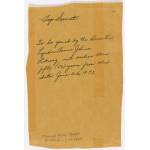"X" Envelope to be Opened by the Director of the Lyndon Baines Johnson Library
6/26/1973
Add to Favorites:
Add all page(s) of this document to activity:

Add only page 1 to activity:
Add only page 2 to activity:
Add only page 3 to activity:
Richard Nixon’s presidential campaign led many to conclude he had a secret plan to end the Vietnam war. Some historians believe he was actually determined to win the war. Others say he planned a negotiated withdrawal from the beginning. We do know he had a secret. He sabotaged Johnson’s peace talks to prevent an agreement from threatening his election.
Acting on a tip, President Johnson ordered an FBI wiretap on South Vietnamese Embassy phones. This confirmed that Nixon was indeed interfering with the peace talks. Nixon had sent an emissary to tell President Thieu of South Vietnam not to sign the peace agreement that President Johnson was currently negotiating. When Nixon became President, he negotiated a peace deal that left Thieu in a more powerful position.
When he left the White House, Johnson instructed his National Security Adviser Walt Rostow to take the files related to Nixon’s interference with the peace talks. In 1973 Rostow gave them to the Johnson Presidential Library with instructions not to open them for 50 years. However, they were opened in 1994, and most of the documents have since been declassified.
Johnson never went public with Nixon’s meddling, believing it would have thrown the country into turmoil.
Acting on a tip, President Johnson ordered an FBI wiretap on South Vietnamese Embassy phones. This confirmed that Nixon was indeed interfering with the peace talks. Nixon had sent an emissary to tell President Thieu of South Vietnam not to sign the peace agreement that President Johnson was currently negotiating. When Nixon became President, he negotiated a peace deal that left Thieu in a more powerful position.
When he left the White House, Johnson instructed his National Security Adviser Walt Rostow to take the files related to Nixon’s interference with the peace talks. In 1973 Rostow gave them to the Johnson Presidential Library with instructions not to open them for 50 years. However, they were opened in 1994, and most of the documents have since been declassified.
Johnson never went public with Nixon’s meddling, believing it would have thrown the country into turmoil.
Full Citation: 'X' Envelope to be Opened by the Director of the Lyndon Baines Johnson Library; 6/26/1973; Lyndon Baines Johnson Library, Austin, TX. [Online Version, https://www.docsteach.org/documents/document/x-envelope-director-johnson-library, April 25, 2024]
Rights: Public Domain, Free of Known Copyright Restrictions. Learn more on our privacy and legal page.






